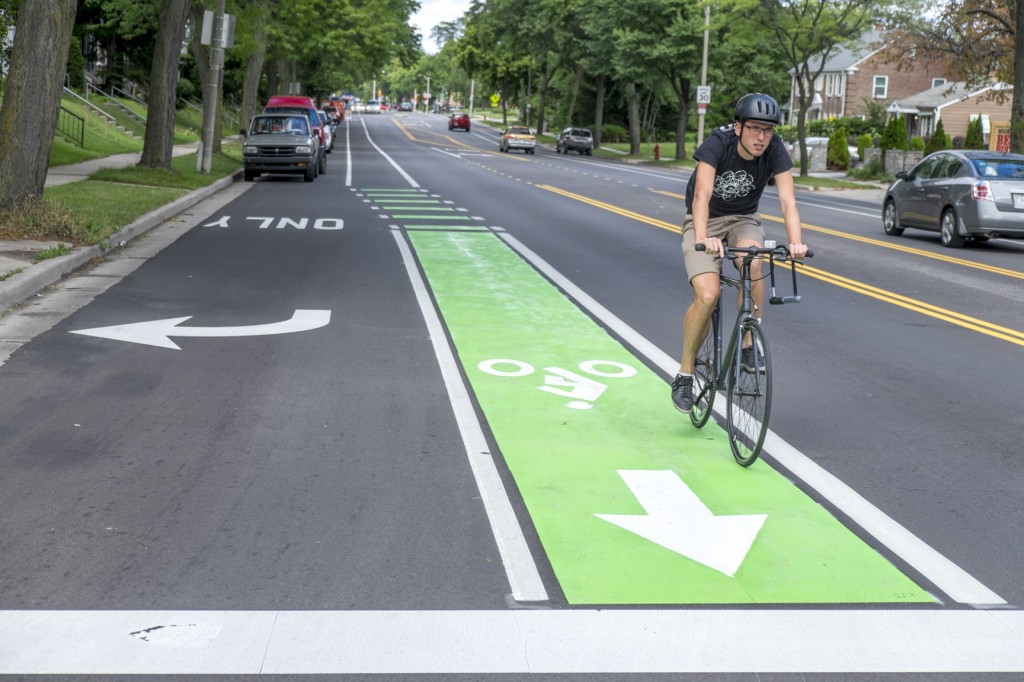Study finds public transit, walking and biking options could help keep Millennials in Wisconsin
New report shows young adults in the state want alternatives to car culture

Green pavement markings in bike lanes can be used to highlight conflict points in mixing zones where motor vehicle and bicycle traffic cross.
MADISON – A new WISPIRG Foundation study released today found that investing in public transit and walking and biking infrastructure could help Wisconsin attract and retain young adults. The report, entitled Millennials on the Move, also indicates that Wisconsin’s current transportation policy priorities – which have focused on expanding major highways at the expense of maintaining existing infrastructure and funding public transit, walking and biking – will fail to create the type of system young adults desire and Wisconsin needs.
“Car culture no longer represents the ‘American Dream’ for many young people,” said Emma Fisher, WISPIRG Foundation organizer and lead author of the report. “By rethinking our transportation spending priorities and focusing on forward-thinking investments, we could make Wisconsin more attractive to the young people that our communities need to thrive.”
To better understand the changing preferences of young Wisconsinites, WISPIRG Foundation staff and volunteers surveyed more than 600 college students on 24 Wisconsin campuses during the 2017-18 school year. The key findings of the survey include:
- 76 percent of respondents said it was either “very important” or “somewhat important” to have transportation options other than an automobile to get around.
- 75 percent of students surveyed said it was either “very important” or “somewhat important” to them to live in a place with non-driving transportation options after graduation.
- 55 percent of students surveyed said they would either be “somewhat more likely” or “much more likely” to stay in Wisconsin after graduation if they could live in a place where trips for work, recreation and errands did not require a car.
“As Madison continues to compete in an ever more aggressive workforce market, we must do everything we can to create a quality of life young people crave,” said Jason Ilstrup, President of Downtown Madison, Inc. “A sense of place is more important than ever. By creating a modern, multimodal public transportation system, we will send a message to all young people that they are welcome to build their home in Madison, Wisconsin.”
Millennials on the Move highlights several Wisconsin communities, from Eau Claire to La Crosse to Madison, that are already working hard to integrate multimodal, 21st century transportation options, and that are effectively attracting young adults. Madison – where local officials have created a network of protected bike paths and lanes, improved walkability and pedestrian safety, and developed a robust public transit system – is considered a great place for young people to live. Millennials made up 26.8 percent of the city’s population in 2015, which is the fifth highest percentage of Millennials in any U.S. city.
Mick Rusch, Metro Transit’s marketing and customer service manager, said, “Metro Transit is currently working with city leaders to explore options for a new east-west bus rapid transit line to make our city’s transit system faster, smarter and more attractive.”
“These findings should give state leaders pause as they put together the next transportation budget,” Fisher added. “Creating a modern and effective transportation system starts with rethinking our spending priorities. Wisconsin’s leaders should stop wasting resources on highway expansions that are unlikely to meet tomorrow’s transportation needs. Instead, we should focus on maintaining the infrastructure we already have in place. We must also invest ambitiously in public transit within communities and between cities and in the walking and biking infrastructure that will make Wisconsin a better place to live for people of all ages. ”
The Wisconsin Public Interest Research Group Foundation is an independent, non-partisan nonprofit that works for consumers and the public interest. Through research, public education and outreach, we serve as a counterweight to the influence of powerful special interests that threaten our health, safety or well-being.
NOTE: This press release was submitted to Urban Milwaukee and was not written by an Urban Milwaukee writer. While it is believed to be reliable, Urban Milwaukee does not guarantee its accuracy or completeness.
Mentioned in This Press Release
Recent Press Releases by WISPIRG Foundation
Wisconsin leaders fail to ensure safe election during COVID-19
Apr 7th, 2020 by WISPIRG FoundationVoters shouldn’t have to choose between their health and democracy
Trouble in Toyland shows how to protect kids from unsafe toys still for sale
Nov 21st, 2019 by WISPIRG FoundationReport identifies most common dangers, calls for government action




















